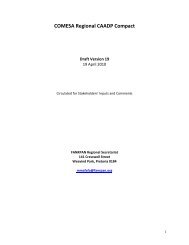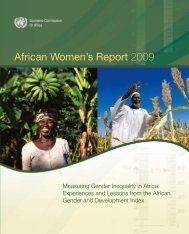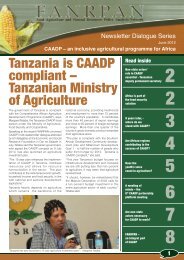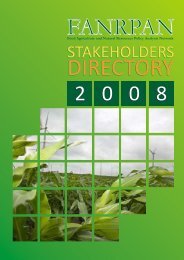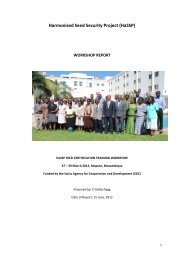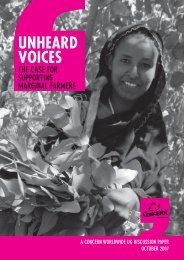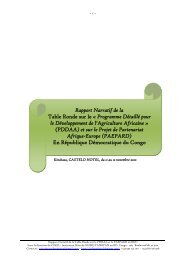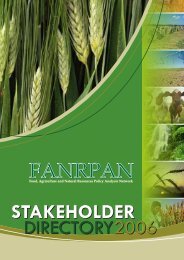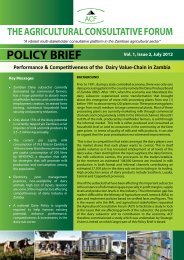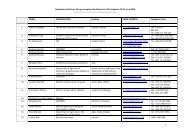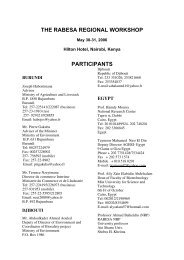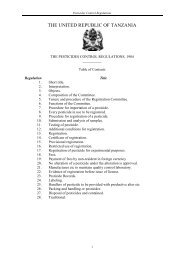Box 16 summarizes the results of those interviews. Questions asked included:• Who decides which microproject is to be selected <strong>for</strong> implementation on behalf ofthe community?;• Does the traditional elite manage selected projects?;• Do traditional elites benefit more than other members of the community?;• If elites do benefit more, does this represent an acceptable way to renumerate the servicesrendered by the elite to the community?Elite capture by agents outside the communitiesIn the literature on CDD, the issue of elite capture is invariably discussed in terms of the impact ofthe dominant elite within a community. There are, however, serious risks of other types of elitecapture, some of which are certainties due to project design.Capture of CDD benefits by project administration and by connected government bureaucracymay occur when project officers disregard the participatory process with the communities andimpose their own preferences in matters related to community institutions, public choice,implementation procedures and type of contractors. Shifting power from community-level partnersto administrators can encourage adopting technical solutions to implement communitymicroprojects that are beyond the capacity of community-level suppliers and imposingprequalification criteria that cannot be met by community-based contractors. This, in turn, shiftsbenefits from community-level artisans to contractors who are external to the communities, allocatesa disproportionate amount of project funds to consultant studies of little relevance to the livelihoodof the community members, and reduces the resources originally allocated to help CBOs learn howto design and operate their own, more modest enterprises. On grounds of efficiency, contracts arelumped together to cover several communities. Then the size and complexity of those contracts areused to justify non-transparency and non-accountability to the community partners.A side effect of this process is that bureaucrats may award contracts as patronage, opening thedoor to possible malpractice even when <strong>for</strong>mal safeguard procedures are officially followed.Consultants’ reports are written in languages that may not be mastered by community membersand often are not made available to the expected beneficiaries of the intervention. In the end, CBOsare deprived of opportunities to learn how to identify, design and implement their own projects,design and negotiate contracts with suppliers, and learn how to monitor their per<strong>for</strong>mance.Box 16Results of opinion survey regardinginstances of elite captureIn Mauritania, respondents confirmed thattraditional leaders were running the affairs ofthe community, but said that they did notbenefit more than other people. This responseseems biased, since <strong>IFAD</strong> has evidence oflocal leaders’ lack of cooperation in recoveringloans made by the Mutuelles d’Investissementet Credit Oasiennes (MICOs).In Mali, 41 per cent of the respondents inSegou and 10 per cent in Kolokany said thattraditional leaders benefited more than otherpeople. In Guinea, only 3 per cent of therespondents said that traditional leaders wererunning the village associations. Nonedeclared that the local elite benefited morethan other people. In Cape Verde, 15 per centof the responding members of the CDAthought that CDA leaders do benefit morethan they deserve, whereas 65 per centdeclared that this was not the case and 20 percent said that they would not know.Interestingly, more than 80 per cent of theinterviewees in all the areas investigatedapproved the investment <strong>decision</strong>s made bytheir leaders’ committee, irrespective of thesocial strata to which the interviewees belonged.However, only 40 per cent to 45 per cent of therespondents knew that the people in themanagement committees are not compensated.Sources: <strong>for</strong> Mauritania, Mali and Guinea: Enquête sur lespartenaires locaux des projets CDD-FIDA, Draft Report, 2008.29
Elite capture by local, professional, political intermediaries occurs when they seek to exploit theproject resources to enhance their own influence in the local government administration and theircareer opportunities within the national political organization. To do this, they may seek to ensurethat project benefits reach their constituency communities even when they do not fully meet theproject partnership conditions. In extreme cases, this type of capture may even divert funds toprovide benefits to people who have little to do with the <strong>rural</strong> communities.CDD and proactive inclusivenessOne of <strong>IFAD</strong>’s key concerns is to ensure that poor and marginalized people have the chance to maketheir voices heard in community affairs that affect their livelihood. To this end, all <strong>IFAD</strong> projectsenvisage special opportunities <strong>for</strong> women, poor households and other marginalized people to have arole in managing community affairs and to participate in making in<strong>for</strong>med <strong>decision</strong>s about activitiesof common interest. CDD projects usually include a quota <strong>for</strong> women in the VDCs and in the MC ofany CIG established by the community.The Enquête sur les partenaires locaux des projets CDD-FIDA did not report any women memberson the MC in Mauritania. In Mali, no women have been elected to the VDCs in the two areasinvestigated by the same survey. In one of these areas, Segou, the project management teamworked exclusively with male representatives of the traditional village chief organizations towhom the people delegated the power to make <strong>decision</strong>s. In Kolokani, the people had muchmore control over the activities of the VDC. Forty per cent of the interviewees in Cape Verde and51 per cent in Guinea declared that women participate in the management structure of theircommunity planning organization.With respect to the role of women in the CBOs, over 75 per cent of the interviewees in the foursurvey areas reported that women attend association meetings and that more than 85 per cent of thewomen participants are ready to speak. Women comprise 60 per cent of the participants in CBOgeneral assembly meetings in Guinea, 64 per cent in Kolokany and 22 per cent in Segou. In Guinea,51 per cent of CSO members are women and 92 per cent of women members attend generalassembly meetings.Generally speaking, a majority of interviewees stated that access to project benefits has beenequitable. There were some curious differences, which cannot be fully explained, in the responsesbetween different implementation regions of the same project:• In Mauritania, 57 per cent of the respondents in the Assaba region said that access to benefitswas equitable compared with 80 per cent in the Adrar.• In Mali, the positive responses ranged from 78 per cent in Segou to 98 per cent in Kolokany.• In Guinea, 100 per cent of the people claimed that everybody benefited, the likely reflection ofthe fact that the public goods funded were available to everybody.• In Cape Verde, 81 per cent of respondents in Santiago and 85 per cent in São Nicholau Islanddeclared that access to benefits <strong>for</strong> <strong>rural</strong> poor and women was equitable.30



